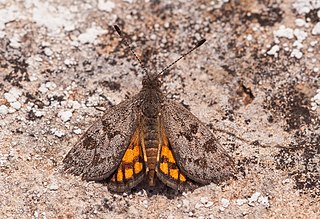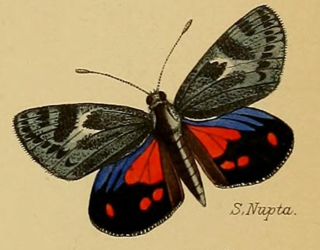
Synemon plana, commonly known as the golden sun moth, is a diurnal moth native to Australia and throughout its range, it is currently classified as vulnerable under the Environment Protection and Biodiversity Conservation Act 1999.

Synemon is a genus of moths within the family Castniidae. It was described by Edward Doubleday in 1846. The genus contains 24 described and 20 undescribed species. These species are found across mainland Australia and on Kangaroo Island, with the highest diversity in Western Australia. Synemon species can be found in a range of habitats, including woodlands, heathlands and native perennial grasslands. The adults fly during the daytime in warm to hot weather. They have clubbed antennae, and are often mistaken for butterflies.
Synemon austera is a moth in the Castniidae family. It is found in Australia, including Western Australia.

Synemon theresa, the cryptic sun-moth, is a species of day-flying moth of the family Castniidae. It was described by Edward Doubleday in 1846. It has a wingspan of 26-40mm, and is mostly grey-brown with orange hindwings. Native to Australia, this species is extinct in Victoria, and is now only known from a relatively small area of South Australia near Adelaide. It uses Themeda triandra and Rytidopserma spp. as larval food plants. Adults can be found from November to February. They only live for a few days, as they do not have a feeding proboscis. Despite becoming extinct over much of its former range, the cryptic sun-moth is not listed as a threatened species in South Australia.

Synemon discalis, the small orange-spotted sun-moth, is a moth in the Castniidae family. It is found in Australia, including South Australia, Western Australia and Victoria.
Synemon nais, the orange sun-moth, is a moth in the Castniidae family. It is found in Australia, including Victoria, South Australia and south-eastern Western Australia.
Synemon collecta, the striated sun moth, is a moth in the family Castniidae. The species was first described by Charles Swinhoe in 1892. It is found in Australia, including Victoria, New South Wales and Queensland. The population in Victoria might represent an undescribed allied species.

Synemon parthenoides, the orange-spotted sunmoth or link moth, is a moth in the Castniidae family. It is found in Australia, including Victoria, Western Australia and South Australia.
Synemon selene, the pale sun-moth, is a moth in the Castniidae family. It is found in Australia, including Victoria and South Australia.
Synemon wulwulam is a moth in the Castniidae family. It is found in Australia, including Western Australia, Northern Territory and Queensland.
Synemon brontias is a moth in the Castniidae family. It is found in Australia, including Western Australia.
Synemon leucospila, the yellow-spotted sun moth, is a moth in the Castniidae family. It is found in Australia, including Western Australia.
Synemon heliopis is a moth in the Castniidae family. It is found in Australia, including Western Australia.

Synemon catocaloides is a moth in the Castniidae family. It is found in Australia, including northern Western Australia.
Synemon laeta is a moth in the Castniidae family. It is found along the east coast of Queensland, Australia.

Synemon gratiosa, the graceful sun-moth, is a moth in the Castniidae family. It is found in Western Australia, from Namburg National Park in the north to Mandurah in the south.
Synemon magnifica, the magnificent sun-moth, is a moth in the Castniidae family. It is found in Australia, including New South Wales.
Synemon maja is a moth in the Castniidae family. It is found in Australia, including Western Australia.

Synemon nupta is a moth in the Castniidae family. It is found in Australia, including Western Australia.
Synemon phaeoptila is a moth in the Castniidae family. It is found in Australia, including the Northern Territory and Queensland.






